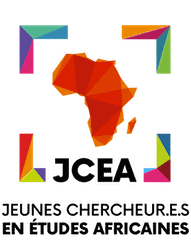|
ATTENTION : Thursday, August 21 an operation is planned on the database server
which may cause access issues on Sciencesconf |
|
Closed - Call for panels / speakers > JCEA 2022 - Call for panels - ClosedCall for panels closed On the 27th and the 29th of June 2022, the 6th Meeting of Young Researchers in African Studies (JCEA) will be held, on the theme of "Les Afriques facing the crises ? Ruptures and continuities". The event will take place on campus at the University Toulouse Jean-Jaurès, alongside with the 7th African Studies Meeting in France « Rencontres des Études Africaines en France (REAF) ».
1. A transversal theme: “Les Afriques” facing crisis ? Ruptures and continuities. A deliberately broad and encompassing theme has been chosen for the 6th meeting of the JCEA: “Les Afriques” facing crisis? Ruptures and continuities". Talking about Africa in plural form indicates that even if the continent is crossed by “crisis”, common history and issues (migratory movements, demographic changes, global warming, (neo)colonialism, etc.), it remains above all marked by a great diversity of contexts that goes against an overly homogenising analysis of these phenomena. The interrogative form of our theme is an invitation to go beyond a descriptive and normative approach to crises and their management. This involves questioning the definition of the term “crisis” and opening up a reflection on the way humanities and social sciences could consider it at a continental level: which actors are involved in designating what is or isn’t a crisis? At what scales and according to what temporalities should they be grasped? How can different levels of analysis and related disciplines be articulated? Moreover, questioning this term is necessary to avoid confining Africa to the image of a passive continent in distress, and to also look at resistance, reappropriation, struggle strategies, agency, etc. More generally, the tension between the concepts of “rupture” and “continuity” could assist in understanding the metamorphoses of the continent without falling into the trap of an eternal restart, without forgetting what persists, in more or less new forms. Epistemological, paradigmatic or methodological ruptures and continuities (induced by an event in the research field, a bibliographic discovery, etc.) should also be explored, from a more reflective perspective. From archaeology to history, from anthropology to political science, from economics to sociology, from geography to environmental sciences, from literature to philosophy and the arts, the dynamics of "crisis" will thus be addressed in all their polysemy and polyphony. The JCEA Meetings wish to call upon the most recent research in progress on these issues. 2. Open workshops on current research in African Studies In addition, the JCEA also proposes a non-thematic entry in order to offer the opportunity to all young researchers on Africa to present the results of their research. Thus, all proposals dealing with Africa and its diasporas, touching on current issues, are welcome. 3. Guidelines to submit a panel To send us your panel proposals for the 6th JCEA meeting, you are invited to create a ScienceConf account, via the above "Login" button. You will then be able to submit an abstract on this tab.
From the 18th of October to the 1st 13 of December 2021, young researchers (doctoral students and PhD who are not yet in a permanent position) are invited, in groups of two people, to propose a theme for a panel that they would like to organise during the JCEA. These panels can be part of the theme ““Les Afriques” facing crisis? Ruptures and continuities" or concern other current issues related to Africa. The panels will be selected by the Scientific Committee, common to the REAF and JCEA. A second call will be published at the end of January, in which the selected panels will be listed, and invite young researchers to propose communications in these panels. The applicants of the selected panels will be responsible for organising the 3 or 4 presentations of their panel.
Panel proposals should be submitted on the JCEA SciencesConf website: https://jcea2022.sciencesconf.org/. You will have to fill in your discipline and institutional affiliation, as well as a title, and summary of 500 words maximum stipulating the theme you would like to develop in your panel. It is not necessary to include the list of bibliographic references quoted in your text. Panels in English are accepted (during the conference, presentations in English must be accompanied by French translated slides).
|


